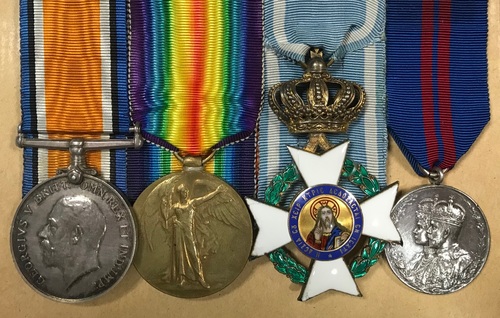
Auction: 18003 - Orders, Decorations and Medals
Lot: 431
(x) A rare Great War Greek Order of the Redeemer group of four awarded to Captain A. L. Strange, Royal Navy
British War and Victory Medals (Commr. A. L. Strange, R.N.); Coronation 1911; Greece, Order of the Redeemer, 3rd class badge, 72 x 45mm., silver-gilt and enamel, the last lacking upper suspension ring and with enamel damage to arms, otherwise generally very fine (4)
Andrew Lumisden Strange entered Britannia as a Naval Cadet in July 1894 and first went to sea as a Midshipman aboard H.M.S. Majestic in 1896. Advanced to Lieutenant in February 1902, he specialised in gunnery at Excellent and won the Egerton Prize in 1905. He was subsequently appointed Gunnery Lieutenant of Queen, the Mediterranean flagship and, in 1909, he joined the staff of the R.N. War College, Portsmouth; in August of the same year he was appointed Gunnery Officer of the King Edward VII with the Home Fleet.
Having then been awarded the Coronation Medal for his services as a member of the Guard of Honour in 1911, he was advanced to Commander at the Naval Ordnance Department in 1913, from which role he was seconded for 'special service' to the Greek Government as a member of the British Naval Mission under Admiral Mark Kerr. He remained there during the early days of the Great War and, in August 1914, in recognition of his services, he was awarded the Order of the Redeemer, 3rd Class (FO 372/542 refers). Strange returned to the U.K. and served at the Admiralty as a member of the Trade Division, Naval Staff and, during 1918, he commanded the light cruiser Sentinel.
At the war's end, Strange was appointed as Assistant to the Director of Naval Ordnance, following which he served as a Divisional Officer of the Coastguard at Hove. Placed on the Retired List in 1923 - in which capacity he was advanced to Captain (Retired) in January 1926 - Strange settled at nearby Norfolk Terrace, Brighton.
Adjudged to be bankrupt in 1928, it took him many years to clear his name, a painful journey recorded within the pages of the London Gazette. The merciless process - and the strain of his subsequent wartime service as Inspector of H.M. Coast Guard, South-Eastern Division - likely contributed to his early demise from heart failure on 24 June 1942; possibly, too, he had never recovered from the loss of his son, who died on active service aboard the carrier Furious in May 1940. The Captain is buried at Gillingham (Woodlands) Cemetery, Kent; sold with copied research, including his service record and Times obituary.
Subject to 5% tax on Hammer Price in addition to 20% VAT on Buyer’s Premium. For more information please view Terms and Conditions for Buyers.
Sold for
£400




